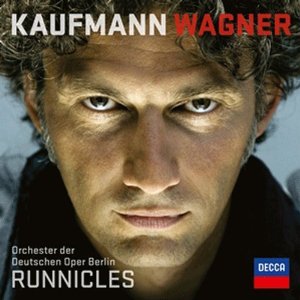|
|
|
|
|
|
|
|
|
Opera News, April 2013 |
| DAVID J. BAKER |
|
|
|
The Conquering Hero - Jonas Kaufmann: "Wagner" |
| Editor's Choice |
|
 Jonas
Kaufmann's new recital confirms his status as the Wagnerian tenor of his
generation. Jonas
Kaufmann's new recital confirms his status as the Wagnerian tenor of his
generation.
To judge from the performances on this
wide-ranging sampler, the Met's new Parsifal seems ready for coronation as
the reigning Wagnerian tenor of his generation. This repertoire is often
thought of as a test of strength, and Jonas Kaufmann obliges with solid,
ringing tone in his selective ventures into heldentenor terrain. All
selections, in fact, find him assured and forceful, apparently fully
recovered from last year's throat ailment and with none of the coy, evasive
manner he has sometimes demonstrated in the higher register.
If the
secure attack adds a thrilling bonus, it's not the core of Kaufmann's
Wagner. He is attuned to the spirit and style of this music, and of course
to its text. His manner, like the strategy he brings to each scene, always
feels perfectly right — even if it stands apart from tradition in some ways.
He pursues a lyrical vein through the dense Wagnerian texture. Each effect
blends into a larger continuous span; transitions count for more than any
individual notes, impressive as the sheer sound can be.
A fine
example of Kaufmann's brand of Wagnerian bel canto is the "Forest Murmurs"
scene from Siegfried, which unfolds with breadth and a sense of free
association (with due credit to conductor Donald Runnicles and the fine
orchestra of Deutsche Oper Berlin) and finds the tenor applying his special
mix of head and chest voices to register the orphan's bewilderment and
yearning. His voicing of the word "Mutter," in a sustained crescendo, is
awe-inspiring. In Siegmund's soliloquy, confirming his fine work in the
Met's recent Die Walküre, Kaufmann gets to show off steely force ("Wälse!")
as well as gleaming, delicate phrases prompted by the thought of Sieglinde.
Impressive breath control underpins the unstoppable, jaw-dropping legato
that distinguishes his Rienzi aria.
One can only hope that the
tenor's mercurial "Am stillen Herd," from Die Meistersinger,is a harbinger
of a full-length assignment. But it's doubtful that he'll tackle the entire
role of Tannhäuser very soon. That hero's Act III Rome narrative is
performed here in a frenzy, with a volley of fortissimos above the staff — a
totally convincing dramatic-tenor display, though probably one that would be
hard to duplicate in public at 11 P.M. after two long acts in the same vein.
These exertions may have made Kaufmann choose not to invest the scene with
narrative details, as tenors do in some recordings, although the snarling,
grating tone he uses in quoting the pope's condemnation adds interest.
The Wesendonck-Lieder, while unexpected programming for a tenor, become
far more than a parlor trick; this is one of the best renditions of these
songs I can recall, with the musicians, led by Runnicles, marvelously
supporting the tenor's fast, flexible pace and lending vibrant instrumental
colors. Lohengrin's farewell rarely has either Kaufmann's radiant poise or
his clarion intensity, let alone both. There's a lively coda to add even
more dynamism, since Runnicles opens up a cut that Wagner himself ordered at
the first performance of the work, in 1850, and which has been observed ever
since (except in recordings under Leinsdorf, Barenboim and Bychkov, acting
on a precedent by Heinz Tietjen in the 1930s).
|
|
|
|
|
|
|
|
|
|
|
|
|
|
|
|
|
|
|